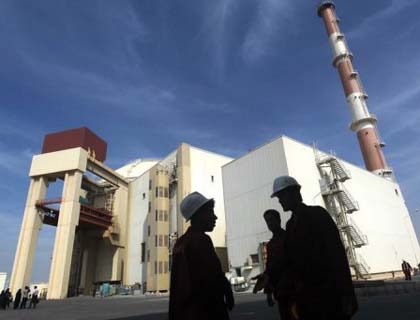Iran has tripled its monthly production of higher-grade enriched uranium and the U.N. nuclear watchdog has "serious concerns" about possible military dimensions to Tehran's atomic activities, the agency's chief said on Monday. As International Atomic Energy Agency head Yukiya Amano voiced his concerns at an IAEA meeting, U.S. President Barack Obama told Israeli Prime Minister Benjamin Netanyahu Washington "has Israel's back" and would not let Iran get nuclear arms.
Amano told a news conference at the IAEA in Vienna there were indications of unspecified "activities" at an Iranian military site which his inspectors want to visit as part of a probe into fears Iran may be seeking nuclear weapons capability.
His remarks confirmed comments made by IAEA diplomats to Reuters last week when one said: "we have heard about possible sanitation" of the Parchin site that he called "very concerning," suggesting Iran may be delaying access while it removed evidence of suspect activities.
The United States and its Western allies are seeking Russian and Chinese backing to rebuke Iran at the week-long IAEA board meeting, that began on Monday, over its failure to address the agency's growing concerns.
Israel has threatened Iran with pre-emptive strikes to stop it getting the bomb, a hawkish approach Obama has tried to rein in to give time for sanctions and diplomatic efforts.
Iran denies it is seeking nuclear weapons capability. Skeptics say it is coordinating efforts to process uranium with high explosives tests and the revamping of a ballistic missile cone to accommodate a nuclear warhead.
Its refusal to curb sensitive atomic work that can have both civilian and military applications has drawn increasingly tough U.N. and Western sanctions against the major oil producer.
SOONER IS BETTER
During visits by IAEA inspectors to Tehran in January and February, Iranian officials stonewalled requests for access to Parchin, seen as central to its investigation.
"We have some indication that activities are ongoing at the Parchin site. It makes us believe that going there sooner is better than later," Amano told reporters, giving no details.
An IAEA report last year presented a trove of intelligence pointing to research activities in Iran relevant for developing the means and technologies needed to assemble nuclear weapons, should it decide to do so.
One key finding was information that Iran had built a large containment chamber at Parchin, southeast of Tehran, in which to conduct high-explosives tests that the IAEA says are "strong indicators" of possible weapons development.
"The agency continues to have serious concerns regarding possible military dimensions to Iran's nuclear program," Amano told Monday's closed-door board meeting, according to a copy of his speech.
A new IAEA report to member states last month said Iran was significantly stepping up uranium enrichment, a finding that sent oil prices higher on fears that tensions between Tehran and the West could boil over into military conflict.
Since the IAEA's previous report in November, Amano said Iran had tripled monthly production of uranium refined to a fissile concentration of 20 percent - well above the level usually needed to fuel nuclear power plants.
It was the first time Amano spoke in public about this rapid increase in Iran's enrichment activities which has stoked Western and Israeli suspicions about Tehran's nuclear agenda.
The Islamic Republic says the more highly refined uranium will replenish dwindling stocks of special fuel for a Tehran reactor that produces medical isotopes.
But 20 percent enrichment, experts say, also represents most of the technical effort needed to attain the 90 percent threshold required for nuclear explosions.
Much of this work is carried out deep inside a mountain at Iran's underground Fordow facility to better shield it against military strikes, and further expansion there is planned.
Despite the largely fruitless talks in Tehran this year, Amano made clear he would keep trying to engage Iran: "The agency will continue to address the Iran nuclear issue through dialogue and in a constructive spirit." (Reuters)

